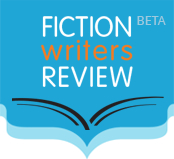In case you’ve missed them, these are the features Fiction Writers Review has been lucky to publish in the last month:
- In an adaptation of his AWP panel talk, Jeremiah Chamberlin discusses “talking shop” in the age of new media:
 [O]nline journals like Fiction Writers Review provide a unique place for emerging writers to join the conversation. After all, few print journals accept book reviews from individuals who haven’t yet published a book themselves. And even if they do, they rarely take unsolicited work. So how does an emerging writer enter this critical dialogue? Here they can.
[O]nline journals like Fiction Writers Review provide a unique place for emerging writers to join the conversation. After all, few print journals accept book reviews from individuals who haven’t yet published a book themselves. And even if they do, they rarely take unsolicited work. So how does an emerging writer enter this critical dialogue? Here they can. - Special guest Peter Turchi offers thoughts on “What to Say and When To Say It” (adapted from the AWP panel of the same name):
Simply omitting information doesn’t create a sense of mystery or tension; you don’t know my shoe size, but you don’t care. The reader needs to be made to want to know what’s being withheld or obscured. If the reader isn’t provoked to want to know more, the story has no forward momentum, no sense of urgency.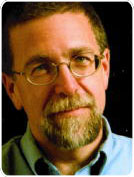
Peter Turchi: photo credit Barry Goldstein
- Also contributing to our AWP panel series, Margaret Lazarus Dean describes the process of turning her MFA thesis into a published novel:
Submitting the first half of my novel (or, as it turned out, first third) [as my MFA thesis] felt like cheating because I not only had no idea how the book might end, I also had no idea how to structure a novel or in fact what the very next page would be. I had struggled through those 150 pages a sentence at a time, and I felt like a fraud presenting what I had come up with as “a novel,” when in fact I still felt like I had no idea how to write such a thing.
Margaret Lazarus Dean / photo credit Joe Vaughn
- Valerie Laken, another participant on the thesis-to-first-novel AWP panel, also recalls the experience of writing and publishing her debut book: it all began with those “magical, dreadful first hundred pages”:
 For those of you who have yet to publish your first book, I can predict with about 96% certainty how it will go: It won’t happen when you want it to, or in the way you expect. Of course it’ll take longer than you want — you know that. It’ll take so long you could grow a tree, learn forestry and paper-making, then print and bind it yourself and carry it by hand to every last remaining independent bookstore in the country. That is, if you don’t succumb first to addiction, poverty, despair, humiliation, or suicide. In short, it will take longer than you think you can stand, and yet, in the end, as you struggle to make your last-chance, oh-my-God-this-is-going-out-in-the-world? revisions, you’ll inevitably feel rushed and wonder where all that time went.
For those of you who have yet to publish your first book, I can predict with about 96% certainty how it will go: It won’t happen when you want it to, or in the way you expect. Of course it’ll take longer than you want — you know that. It’ll take so long you could grow a tree, learn forestry and paper-making, then print and bind it yourself and carry it by hand to every last remaining independent bookstore in the country. That is, if you don’t succumb first to addiction, poverty, despair, humiliation, or suicide. In short, it will take longer than you think you can stand, and yet, in the end, as you struggle to make your last-chance, oh-my-God-this-is-going-out-in-the-world? revisions, you’ll inevitably feel rushed and wonder where all that time went.- Kate Levin talks to author Adam Haslett about his debut novel, Union Atlantic, and his story collection, You Are Not a Stranger Here. When asked how and where he writes his way into a voice, Haslett responds:
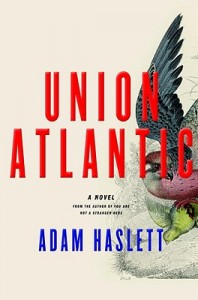 The reason you have to spend so long at your desk is because you need to be there when it happens. It’s nice to think that you’d walk down the street and something would come to you whole cloth, but it doesn’t happen much. It has to do with a certain calming of the mind, quieting the voices of distraction. I meditate every morning before I work, and that’s a process of getting rid of a lot of the things that block out those quieter, subtler voices in your own mind. So, I don’t know if I can say that I can summon those voices, but maybe I can hear them better. It’s sort of a negative skill, the skill of concentration. It’s the skill—increasingly difficult, it seems to me—of blocking out a manic culture, in order to be able to listen to something that, when you first hear it, is a wisp of a nothing of an echo. And if it’s ever going to have life, you have to pay attention to it, take it seriously, let it be more important than other things that are way more produced and slick and loud.
The reason you have to spend so long at your desk is because you need to be there when it happens. It’s nice to think that you’d walk down the street and something would come to you whole cloth, but it doesn’t happen much. It has to do with a certain calming of the mind, quieting the voices of distraction. I meditate every morning before I work, and that’s a process of getting rid of a lot of the things that block out those quieter, subtler voices in your own mind. So, I don’t know if I can say that I can summon those voices, but maybe I can hear them better. It’s sort of a negative skill, the skill of concentration. It’s the skill—increasingly difficult, it seems to me—of blocking out a manic culture, in order to be able to listen to something that, when you first hear it, is a wisp of a nothing of an echo. And if it’s ever going to have life, you have to pay attention to it, take it seriously, let it be more important than other things that are way more produced and slick and loud.- Brian Short reviews and strongly recommends Kevin Wilson‘s debut story collection:
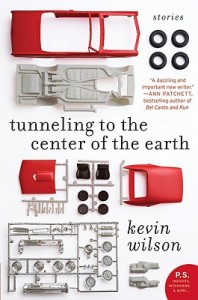 If Tunneling to the Center of the Earth (HarperPerennial, 2009) were a child, it would be the kind who held your hand until you reached the road and then insisted—slapping at your grasping fingers without taking his eyes off the road—on crossing the street without help. If Kevin Wilson’s debut collection were a car, it would be the kind of bubble-topped, shark-finned future-car that you see on footage of old World’s Fairs, but you would see it out in the world, cruising the miracle mile. If this book were a friend, it would be the kind who goes with you to the bar and doodles on napkins all night while everyone pounds beers and then, when everyone has forgotten about her, comes out with a one-liner that brings the house down.
If Tunneling to the Center of the Earth (HarperPerennial, 2009) were a child, it would be the kind who held your hand until you reached the road and then insisted—slapping at your grasping fingers without taking his eyes off the road—on crossing the street without help. If Kevin Wilson’s debut collection were a car, it would be the kind of bubble-topped, shark-finned future-car that you see on footage of old World’s Fairs, but you would see it out in the world, cruising the miracle mile. If this book were a friend, it would be the kind who goes with you to the bar and doodles on napkins all night while everyone pounds beers and then, when everyone has forgotten about her, comes out with a one-liner that brings the house down.- And in his latest Quotes and Notes column, Steven Wingate uses a Simone de Beauvoir quote as the jumping-off point for a discussion of genius as something to “inhabit, enable, fill” our writerly lives–rather than something to possess or try to become:
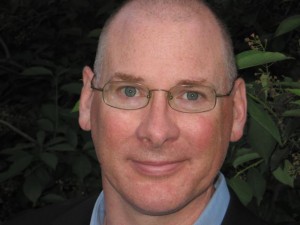 Genius can arrive when we pick up a pen, when we pick up a literary magazine, when we pick up a manuscript that no one else has read. This concept of genius can be a liberating thing, because there’s no pressure on us to be one; there’s only an invitation to participate in genius, as so many before us have done and will do in the future.
Genius can arrive when we pick up a pen, when we pick up a literary magazine, when we pick up a manuscript that no one else has read. This concept of genius can be a liberating thing, because there’s no pressure on us to be one; there’s only an invitation to participate in genius, as so many before us have done and will do in the future. - Valerie Laken, another participant on the thesis-to-first-novel AWP panel, also recalls the experience of writing and publishing her debut book: it all began with those “magical, dreadful first hundred pages”:
Subscribe to FWR‘s RSS feed to be sure you won’t miss out on our upcoming reviews, essays, and interviews.

